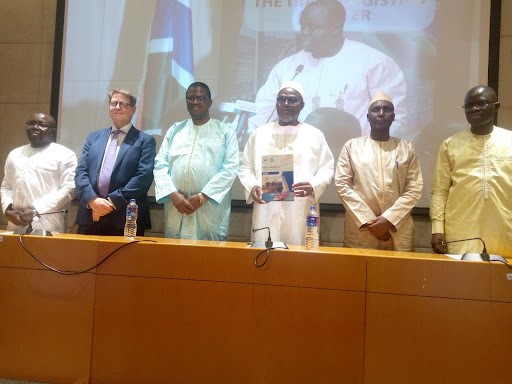By Ndey Sowe
The Ministry of Trade, Industry, Regional Integration, and Employment has officially launched the Trade Logistics Charter, an initiative aimed at enhancing trade efficiency and logistics within the country. The event took place on the 15th of November, 2024, at the Sir Dawda Kairaba Jawara International Conference Centre, Bijilo. The Trade Logistics Charter represents a pivotal step towards improving the trade landscape in The Gambia, fostering economic growth, and facilitating smoother trade operations.
The Ministry of Public Service in collaboration with the Office of the President and the Tony Blair Institute coordinated the development of the Trade Charter for the enhancement of trade and logistics efficiency within The Gambia, to bolster regional competitiveness. In early 2023, a diagnostic study identified bottlenecks in trade flows and customs processing, shaping the Charter’s priorities. The Trade Logistics Charter Committee validated the document in October 2024, setting clear performance benchmarks for all key actors in the trade corridor including customs, the Gambia Ports Authority, the General Transport Union, and security agencies.
Muhammed B.S. Jallow, the Vice President of The Gambia delivered a keynote address to outline the objectives and expected impacts of the Charter on the nation’s economy and trade sector.
According to Vice President Jallow, the historic development represents a critical step towards transforming our nation’s trade ecosystem as well as positioning the country to better continue her path to economic growth and prosperity. He said the Charter will act as a foundation for improving the operational efficiency of the country’s port and trade eco-system, thus ensuring that ‘‘we join the region’s lost revenue and secure a brighter and more cooperative future for the Gambia.”
The Vice President asserted that the Charter is more than a document. He said it is a framework meant to bind all stakeholders within the trade community.
“The new trade logistics Charter represents my government’s commitment to maximizing the value of this significant investment. The ultimate objective of this is to impact the lives and livelihoods of Gambians, and create economic opportunities and affordable commodities for all,” Vice President Jallow added.
Alieu Loum, Permanent Secretary at the Ministry of Public Service, said the Trade Logistics Charter is a strategic initiative for the country’s economic prosperity, adding that the Charter is timely and relevant because it promises to reshape the Gambia’s trade sector feature and unlock new growth opportunities designed to overhaul trade infrastructures, streamline processes and position the Gambia as a competitive force in the global stage.
“The charter has been developed through a collaborative effort of key government ministries, departments, and agencies. Key among them are The Gambia Revenue Authority, Gambia Ports Authority, and other private sector players and the support of the Tony Blair Institute. This forward-looking blueprint aims to make The Gambia’s trade sector more efficient, cost-effective, and attractive to international investment,” he underscored.
He went on: “The Charter aspires to transform the Banjul Port into West Africa’s leading trade hub with clear measurable key performance indicators guiding our progress towards accountability and efficiency”.
Frank Matsaert of the Tony Blair Institute Global Lead for Trade and Infrastructure congratulated the Gambia government for taking forward the initiative.
“It is a great achievement for The Gambia,” Mr Frank commented, and highlighted the importance of the Charter adding that it will foster change and reduce trade costs to assist the average Gambian.
Mr Frank went on: “I think the Charter is important because it brings everybody together around one key objective which is really to transform trade for The Gambia.”


















